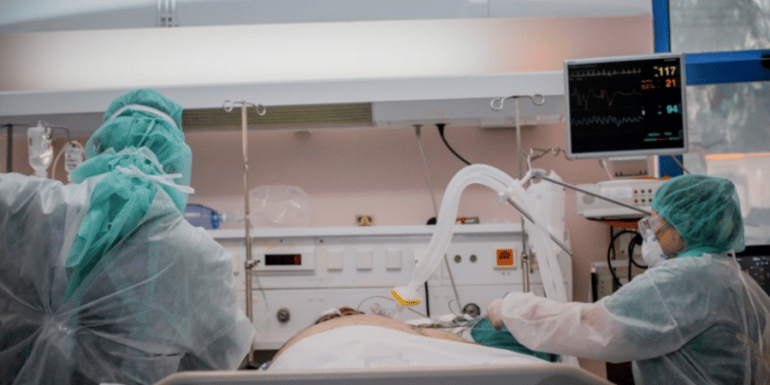There has not been a case of cholera in Cyprus recently, nor in the past, the Director of the Medical Services of the Ministry of Health, Elisavet Constantinou, told KYPE, who indicated that at least since 2000, the year from which the Ministry of Health keeps statistics, no there are recorded incidents.
Called by the KYPE, on the occasion of an announcement issued by the Ministry of Health, which speaks of an increase in cholera cases in neighboring countries, to state whether Cyprus faces an immediate danger, Ms. Konstantinou said that the announcement was sent with the aim of informing the citizens, while he noted that the objective of the competent Ministry is to inform travelers to these countries.
Mrs. Constantinou made recommendations to the public, regarding the observance of personal protective health measures and especially systematic hand hygiene.
He stressed that travelers should always observe personal protective health measures and be vigilant upon their return if they show symptoms.
Two incidents in Europe in the last year
———————————–
Responding to a related question, Mrs. Constantinou said that "in Cyprus there has not been a case of cholera recently, nor in the past", to note that two cases of cholera have appeared in Europe in the last year.
He noted that "in the past the number of cases that appeared in Europe was very low", to add that "the cases that are usually found in Europe concern travelers who have visited countries" where there are cases, mainly in Africa and Asia".
Cholera cases have recently been recorded in countries neighboring Cyprus, specifically in Syria, which recorded 807 confirmed cases and 68 deaths, with several more suspected cases from the end of August until October 2022, as well as in Lebanon, where 5.912 cases were recorded with 23 deaths from early October 2022 to January 5, 2023.
Description
----
In today's announcement, the Ministry of Health states that cholera is an acute diarrheal disease, which is due to the intestinal infection by enterotoxin produced by strains of the Vibrio Cholera bacterium.
Some of the enterotoxin serotypes cause severe disease known as "cholera" and epidemics. Residents of disease-endemic areas acquire cholera antibodies in childhood.
Cholera epidemics have been described in the past with tens of thousands of cases and hundreds of deaths.
Ways of transmission
--------
The disease is transmitted through consumption of contaminated water or food. Water is usually contaminated by patient faeces which in turn can directly or indirectly contaminate food. Food can also be contaminated by dirty hands during meal preparation or consumption.
The incubation period of the disease ranges from a few hours to five days and the patient transmits the disease up to 10 days after the onset of the disease.
The disease affects all ages and presents mainly with severe acute diarrheal syndrome and vomiting leading to dehydration and in severe cases and death if not treated in time.
Treatment
———–
Hydration is the cornerstone of treatment. Oral administration of fluids and salts, as well as intravenous administration of fluids and electrolytes in severe cases, reduces mortality. Antibiotics are given only in severe cases.
Information for Travelers Arriving from Countries Experiencing Cholera Outbreaks
-----------
Travelers returning from countries with an outbreak should be on heightened alert for symptoms of the disease, as listed below.
In case of symptoms of the disease, they should apply contact precautions and strict hand hygiene measures and go to the hospital.
Vaccinations and General Precautions for Travelers
---------
The World Health Organization recommends vaccination for people traveling to countries where cases have been reported. However, according to information from KYPE, there is no vaccine against cholera in Cyprus.
As a precaution, people traveling to areas with poor sanitary conditions are advised to consume bottled water and beverages, pasteurized dairy products and milk.
It is also recommended that they avoid ice cubes, raw salads, reheated food, as well as raw seafood and prefer peeled fruits.
In addition, they should strictly follow the rules of good hygiene.
It is understood that in case of any medical problem one should immediately contact the official medical services of the country.
In particular, travelers should carefully choose the foods and drinks they consume, eat foods that are well cooked and still hot when served, prefer fruits, nuts and vegetables that have a thick casing, peel or shell which will they must wash or peel them themselves before consumption, use sealed and bottled water or sparkling water, consume drinks straight from the can or bottle and ask for drinks without ice.
Also, travelers should not consume fresh salads, raw or undercooked eggs, poultry, meat and seafood, consume cooked foods that have been at room temperature for several hours (e.g. buffets), consume granitas or frozen drinks which are likely to have been prepared with contaminated water, consuming fruit juices unless they come directly from a sealed can, and consuming tap water.
Source: KYPE
